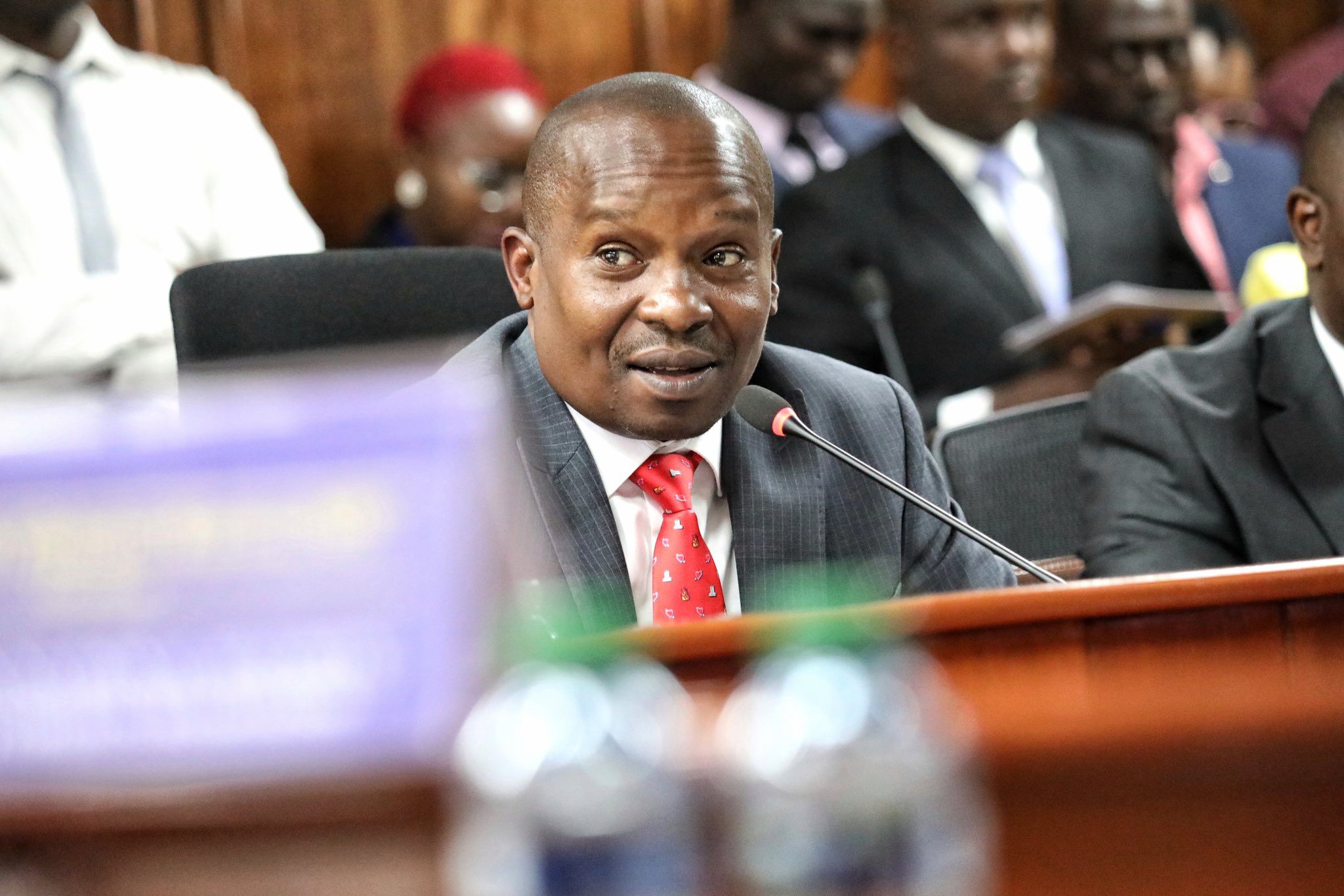Ministry of Information, Communications and Digital Economy through the Ajira And Jitume Programs have embarked on creating new jobs and learning opportunities to help curb ongoing high unemployment rate among the youth today. These programs are aimed at equipping citizens with technical, vocational, digital education and digital skills for digitally enabled jobs.
Furthermore, The Ministry through a collaboration with the Technical and Vocational Education and Training Authority (TVETA) is also working to equip Technical and Vocational Education and Training Institutes (TVETs) with 23,000 digital devices.
Currently, a sum total of 8,159 devices have been supplied to 112 institutions throughout Kenya.
Additionally, according to the Proposed MIC-DE Scorecard – Year 1 Final report, Jitume seeks to equip a million Kenyans with on-demand ICT skills and entrepreneurship knowledge. This will enable them to tap into the available vast opportunities for digitally enabled jobs.
As of 31st July 2023;
- 77 TVETs are supplied with 6,700 Virtual Desktops.
- 4 Universities are supplied with 400 Virtual Desktops.
- 1 Community Centre had been supplied with 100 Virtual Desktops.
- 21 Schools had been supplied with 100 Virtual Desktops.
- 8 MDAs had been supplied with 100 Virtual Desktops.
- 1 County Government had been supplied with 5 units.
- 34 Sites had been officially launched.
So far, the Ajira Programme has directly linked 109,000 youth to digital jobs in Kenya. This jobs include business processing in companies based in Ndhiwa, Mbeere, Kirinyaga Central, Mombasa, and Nairobi.
Currently a total of 336,000 are undergoing digital training under the Ajira Programme.
Moreover, the operationalization of the Kenya Advanced Institute of Science and Technology (Kenya-AIST) is at its advanced stage. This is a skills development project, planned for the provision of postgraduate programs in advanced science and technology.
Furthermore, the Kenya National Open University ( a virtual university and one of the flagship initiatives that the Kenya Kwanza Government) is on course to be operational by September 2023.
Once it becomes functional, the National Open University will make university education more affordable, accessible and attainable to all students no matter their location, or income levels.
Other Programs announced in the Proposed MIC-DE Scorecard – Year 1 Final report include;
Laying Of National Optic Fiber Backbone Infrastructure
The government, through a partnership with key private Sectors, has installed 5,280 Km of fiber optic cables. The partnership saw the private Sector players (Liquid Telcom, Wananchi Group, Safaricom, and Airtel, among others) install 2,500 Kms of the fiber optic cables and the GoK installing the remaining 2,780 Km.
Other Partners include KPLC, KETRACO, TELCOM, Kenya Railways and KPC.
Furthermore, to accelerate the fiber connectivity to the County Governments, the Ministry will optimize on use of already available fiber connectivity from the above agencies.
Upgrading The Government Common Core Network
The GoK plans to Upgrade the now 15 year old network that was implemented back on 2008. The aged infrastructure has resulted in frequent internet outages across the Ministries, Departments and Agencies (MDAs).
Upgrades are currently taking place which will see laying of ducts in the Central Business, Upper Hill (Nairobi), all the way to Kenyatta National Hospital, and Thika Road.
Installation & Operationalization of Public WiFi Hotspots
The Ministry’s collaboration with County Governments has led to the setting up of 194 of the WiFi markets and County Headquarters.
Furthermore, 172 WiFi Connections have been established as part of Community Innovation Hubs, and an additional 14,690 public Wi-Fi hot-spot sites have been identified across the country.
Digitalization of Government Services
As of 31st July 2023, the Ministry had identified 9,362 Government services, covering 179 Multi-Channel Data Acquisition Systems (MCDAs) for digitalization. Of this number, 5,084 are fully digitalized services and another 2,555 services are partially digitalized.
The digitalization priority sectoral areas include Health, Lands, Kenya Revenue Authority, Transport, Education, Border Control, Citizen Services and Cabinet.
Digital Entrepreneurship
To support digital entrepreneurship, the Ministry has held conversations with operators on producing low-cost digital telephone gadgets and other digital devices. The first batch will roll out this year and retail for about USD 40.00 per unit.
E-Commerce
Through the Ajira Digital Programme, the Ministry has raised countrywide awareness on digitally-enabled jobs and the Digital Economy to 53% among adults, and 56% among the youth. This achievement is an indicator of a very promising Digital Economy and digital entrepreneurship in the country.
Furthermore, the incorporation of digital marketing and ecommerce training modules to the Ministry’s Ajira Digital Skills training program has adequately prepared the over 300,000 youth to take up opportunities in the e-commerce space.
Digitalization Of Cabinet
The Cabinet secretariat of Kenya has for the last decades operated its activities manually. In order to provide quality services to the Cabinet and other government agencies will improve efficiency and effectiveness by leveraging on technology.
To this end, the joint secretariat has delivered, installed, and operationalized 92 video conferencing facilities in all government Ministries and state departments, the Presidency, and the office of the Prime Cabinet Secretary as of June 2023.
Cyber Security, Risk Mitigation, And Data Protection
Kenya has embarked on steps to ratify the African Union Convention on Cyber Security and Personal Data Protection. Under the aegis of the African Union, the Malabo Convention envisages Africa as a single entity for purposes of data protection and privacy. It calls for a harmonized, independent,and robust continental legal framework, which will protect all the peoples of Africa.
Furthermore, a multi-agency Government team has been established to handle cybersecurity. It includes representatives from the Ministry of Defence, Ministry of Interior and National Administration, NIS, Ministry of Information, Communication and the Digital Economy among others.
National Addressing System
The Ministry has developed a draft Policy and Bill on the National Addressing System. Currently, the bill awaits validation by stakeholders pending before submission for Cabinet approval.
The National Addressing System will deploy these blocks to facilitate e-commerce within the country.
Negotiated World Bank Funding – Kenya Digital Economy Acceleration Program (KDEAP)
On JUNE 14th, the National Treasury and the World Bank Signed an agreement to fund key government components.
KEY COMPONENTS FUNDED INCLUDE;
- Digital government services infrastructure, architecture, data privacy and security.
- Digital skills.
- Project management.
- Regional component.
- Data-driven public service delivery.
- Digitization of strategic sectors.
- Broadband access, affordability and quality.
Universal Service Fund
The Ministry negotiated funds worth Ksh. 5Bn from the Universal Service Fund to support the GoK digitization agenda. The funding will support the following areas;
- Implementing a 2,500 km of fiber optic cable digital super highway.
- Digitalization of Government Services.
Kenya Broadcasting Corporation Revitalization
The Ministry has adopted a twin-pronged strategy to help revitalize the Kenya Broadcasting Cooperation. The strategy takes into place 2 consideration;
INFRASTRUCTURE & RETOOLING
This includes;
INFRASTRUCTURE & RETOOLING:
- Modernization of TV Centre.
- Purchase of TV Outside Broadcasting (OB) Van.
- Upgrading of Digital Terrestrial Broadcasting Infrastructure.
- Migration from Medium Wave (MW) to FM.
- Increase FM Radio coverage through the installation of 20 additional transmitters.
REVIEW OF CONTENT & BUSINESS MODEL:
- Focus on Sponsorship Deals: WRC (Safari Rally) and KPL (Football) Coverage Free to Air Rights Negotiated.
Establishment of A National Contact Centre
The Ministry has embarked on the establishment of a “National Contact Center” that will be a central point from which citizens interact with the Government across various channels.
Additionally, the contact center will utilize digital methods of communication—like social media messaging, email, and online chats—to connect with customers.
To this end, the Ministry is currently piloting a contact centre that provides service to all citizens by dedicated contact center officers who provide 24/7 365 availability to support citizens seeking to interact with the Government.
This service is underway in KONZA in Nandi, Elgeyo, Marakwet, and Baringo.
Implementation & Operationalization of Digital Signature
The Ministry has embarked on implementation and operationalization of a digital signature. This will enable GoK entities to undertake secure authentication of documents and secure transactions as part of enabling E-commerce and digital transactions.
Implementation and deployment of digital signatures in MDAs is ongoing.
Legal and Policy Frameworks
Some of the Policies discussed include;
National Policy on Public Relations and Communication Management. This will professionalize information sharing between institutions/organizations and the public.
National Addressing System of Kenya Policy. Its proposed at guiding the establishment of a national addressing system for Kenya.
National ICT Policy Guidelines, 2020. The policy will serve to amend the 30% equity participation rule required for licensing of ICT services licensees.
Access to Information Policy. The policy will serve to create a basis for the implementation of the Access to Information Act.
Some of the legislations discussed include;
The Public Relations and Communication Management Bill. The legislation will establish a legal framework to regulate the manner in which professionals conduct their practice.
Access to Information Regulations. This will facilitate the implementation of the Access to Information Act, 2016.
Kenya Information and Communications Act (Amendment) Bill.
ICTA Bill. The bill will make provisions for emergent issues in ICT space for example
- Registration of ICT government service vendors.
- Setting and enforcement of ICT standards for GOK.
- Regulation of ICT practice.
Kenya Information and Communications Act (Amendment) Bill.The bill will ensure that the Act aligns to current market imperatives such as infrastructure sharing.
National Addressing System of Kenya Bill. The bill will establish a mechanism for the establishment of A National Addressing System for Kenya.
KIMC (Kenya Institute of Mass Communications) Bill.
The bill will;
- Give KIMC a solid legal foundation.
- Empower KIMC to execute its mandate.
Technopolis Bill. The bill will;
- Assist in developing the Technopolis and accelerate the Knowledge Economy and Innovation.
- Establish Africa Regional Hub and promote the development of software for export.
- Give a solid legal foundation for KoTDA (Konza City).


















